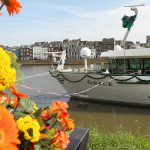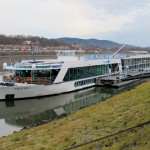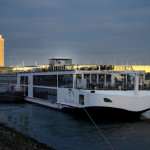Flying to Europe — or beyond — can be a daunting task. With summer turning into fall, and fall giving way to winter, it also brings us into the prime season for flight delays and cancellations. But there are a few tricks we use year-round to ensure that we get to where we’re going as reliably as possible — and with luck, our luggage makes it too.
1. Take Control of Your Flights

Every river cruise line and travel agency will offer to book your flights for you, but we recommend against it unless you absolutely must. The reason for this is that by being able to choose and book your own flights (perhaps in conjunction with a travel agent), you’re taking control of your itinerary and eliminating problems before they can arise.
Are you a frequent flier with a particular airline or alliance? Do you have a preference about what cities you connect through or even what time you depart and arrive? Booking your air on your own can ensure that you get the flights you want, on the airline of your choice, without having to pay additional fees to do so.
2. Don’t Play Chicken with Departure and Connection Times

Having more control over your flights also means being responsible about them. Just because an airline offers an 8 a.m. departing flight on the final day of your river cruise doesn’t mean you should take it.
Likewise, be mindful of connection times and note that not all airports are created equal when it comes to connections. A 35-minute connecting flight is entirely possible in Dusseldorf International, while absolutely ludicrous at Paris, Charles de Gaulle.
Choose the flights that give you as much breathing room as possible for departure, connection and arrival.
3. Learn More about the Airports on your Journey

Some basics to figure out: How far is the airport from the pier? How long will it take you to get from Point A to Point B? And – if you haven’t purchased transfers from your river cruise line — what is the cost to get to the pier by taxi, bus or train?
Another thing to look at, in the case of delays, how many flights are offered from that airport? Say you’re departing from Nuremberg to Amsterdam: How many times does KLM fly there? Do any other airlines fly there? Knowing this can help save you time in the event your flight is delayed or even cancelled.
4. Know What Documents You’ll Need

For most air travel — particularly to Europe — a Passport is all the identification you’ll need. But did you know that passport has to be valid for up to six months from the date of your return? If it’s not, you could be denied boarding, either by the airline or by the river cruise operator themselves.
The rationale behind this is simple: in the event of an unexpected delay, your passport validity should never be in question. If your passport was only valid for a few days upon your return — and you were waylaid by months or even weeks — that could create some significant issues.
Also, make sure you don’t require a Visa to enter your destination; these can take five business days or longer to procure, and typically — but not always — require you to hand over your passport during that time. If you travel frequently on business, this can present an extra stumbling block.
5. Have a Backup Plan

Before I travel, I always carry a small list of alternate flights with me; these are nothing more than the airline code and flight number (for example, LH 1069 from Nice to Frankfurt.) You can find these by using sites like Kayak, which display nearly all available flights from one particular place to another, on nearly every airline.
Having this alternate list has saved me more than once.
In the event of a cancellation, most travelers are forced to go to the counter, queue up, and take whatever flight the person working the counter offers. But by knowing what other flights your airline has available, you can ask if there is space to be placed on a particular one. There may not be, but at least you’re taking control of the situation to the greatest extent possible.
Do you have tips and tricks for flying to your river cruise? Let us know.



